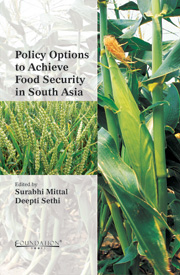Book contents
- Frontmatter
- Contents
- List of Contributors
- Foreword
- Acknowledgements
- List of Abbreviations
- 1 Food Security in South Asia
- 2 Food Security in India: Policies and Options
- 3 Multiple Facets of Food (In) Security in Sri Lanka: An Input to Food Policy
- 4 Food Security in Bangladesh: Achievements, Challenges and Way Forward
- 5 State of Agriculture and Food Security in Pakistan
- 6 Food Security Situation in Nepal: Issues and Suggested Policy Measures
- 7 Food Security in Maldives
- 8 Role of Regional Trade and Rural Development for Food Security in Bhutan
- 9 Food Security in Afghanistan
5 - State of Agriculture and Food Security in Pakistan
Published online by Cambridge University Press: 05 June 2012
- Frontmatter
- Contents
- List of Contributors
- Foreword
- Acknowledgements
- List of Abbreviations
- 1 Food Security in South Asia
- 2 Food Security in India: Policies and Options
- 3 Multiple Facets of Food (In) Security in Sri Lanka: An Input to Food Policy
- 4 Food Security in Bangladesh: Achievements, Challenges and Way Forward
- 5 State of Agriculture and Food Security in Pakistan
- 6 Food Security Situation in Nepal: Issues and Suggested Policy Measures
- 7 Food Security in Maldives
- 8 Role of Regional Trade and Rural Development for Food Security in Bhutan
- 9 Food Security in Afghanistan
Summary
Introduction
Pakistan is the sixth most populated country in the world and has the second largest Muslim population in the world after Indonesia. Pakistan has been considered as a low-income country by the World Bank. About 55 per cent of the adults in Pakistan are literate and life expectancy is 64 years. According to WDI 2009, its population in 2008 was about 166 million and is growing at 2.2 per cent annually. The low level of spending in the social services and high population growth have led to persistent poverty and unequal income distribution. Pakistan's extreme poverty and underdevelopment are the key concerns for the country especially in rural areas.
In South Asia, Pakistan is the second major food producer, next to India. However, despite this fact, the issue of food security has not been resolved in the country. At the time of partition of Pakistan from India in 1947, the present day Pakistan was self sufficient in the production of food, but after the partition, Pakistan was unable to maintain its self sufficieny. The reasons which explain failure to attain self-sufficiency are – lack of political will, negligence of agriculture, unequal distribution systems, scattered land holding, lack of land reform policy, and low investment in agriculture sector. Due to this, Pakistan is also the second most undernourished and malnourished region of the world.
Pakistan needs to devise policies at national, regional and international levels which can help to understand and resolve the problem of food security. In this context, this chapter discusses various aspects, policies and strategies to attain food security in Pakistan. The chapters also throw light on the state of agriculture, role of trade and food bank, and way forward to achieve food security in the country.
- Type
- Chapter
- Information
- Policy Options to Achieve Food Security in South Asia , pp. 106 - 136Publisher: Foundation BooksPrint publication year: 2011



